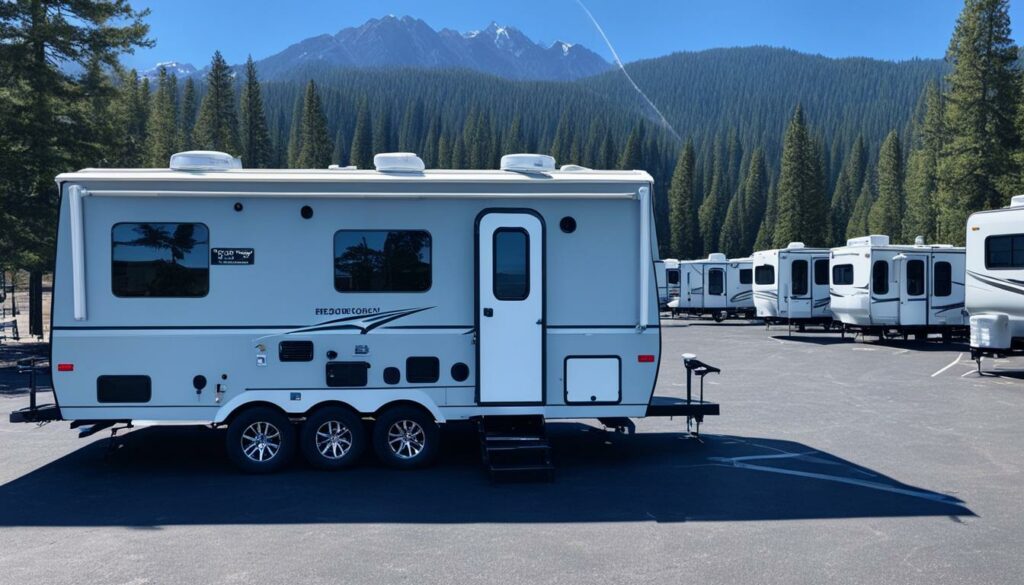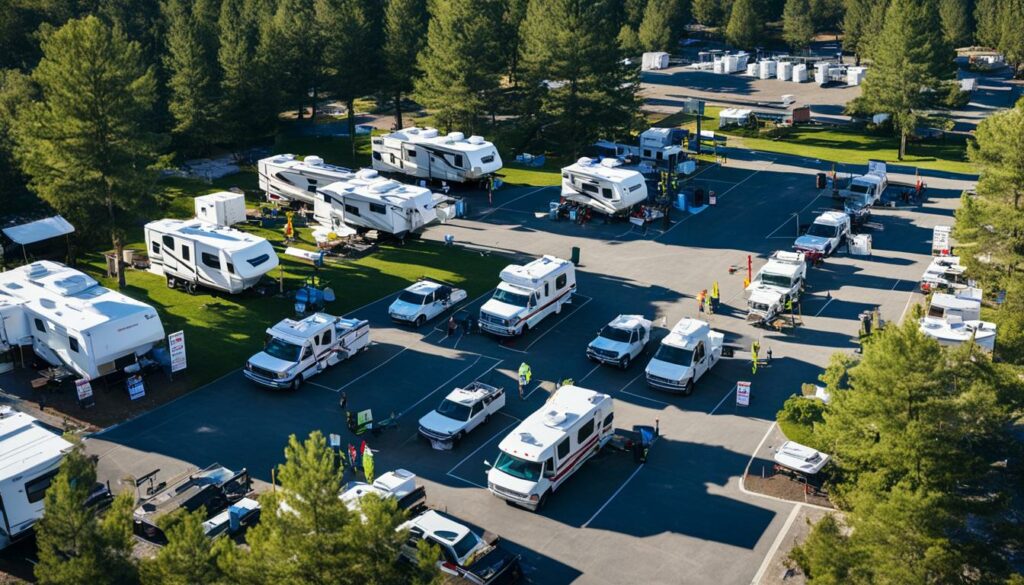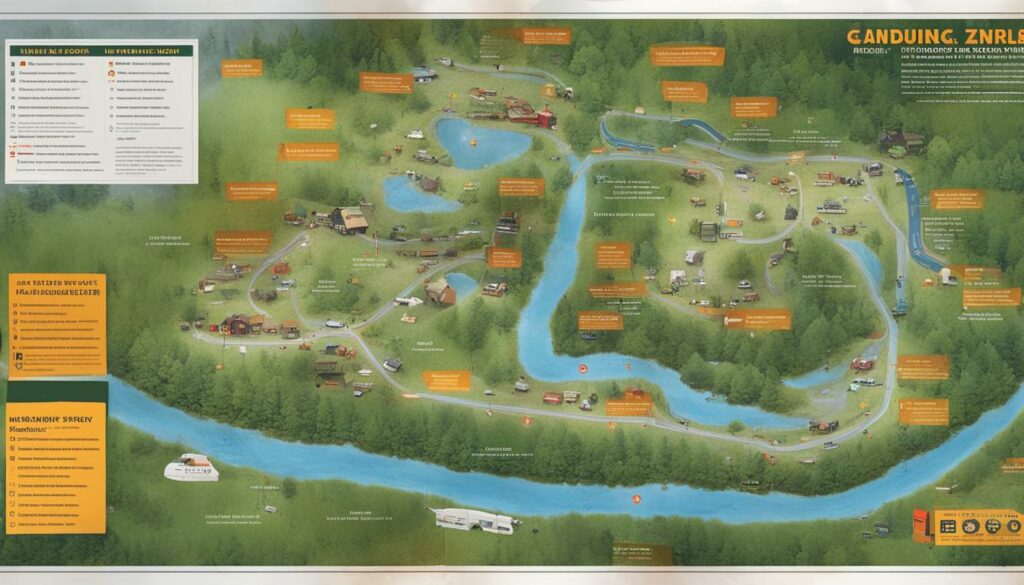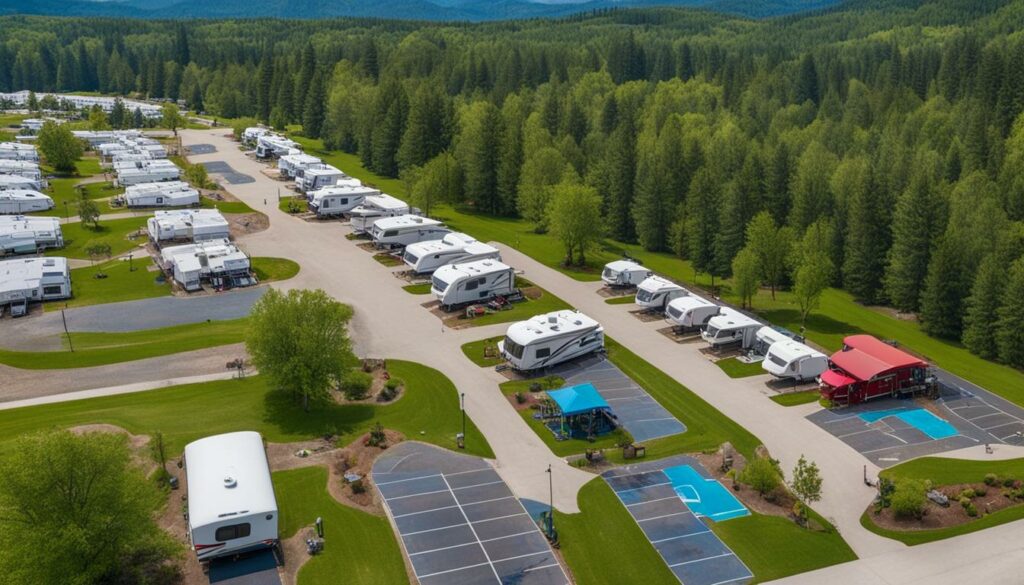Ensuring the safety and well-being of RV park campers is of utmost importance. With the ongoing COVID-19 pandemic and the potential hazards associated with RV park living, it is crucial to establish and implement effective safety protocols.
RV park safety protocols should cover a wide range of areas, including general safety guidelines, COVID-19 precautions, RV safety guidelines, and sanitation guidelines. By focusing on these key areas, RV park operators can create a safe environment for campers to enjoy.
Key Takeaways:
- Implementing safety protocols is crucial to ensuring the well-being of RV park campers.
- RV park safety protocols should address general safety guidelines, COVID-19 precautions, RV safety guidelines, and sanitation guidelines.
- By prioritizing safety, RV park operators can create a secure and enjoyable environment for campers.
Developing Robust RV Park Safety Protocols
Developing effective safety protocols in an RV park is crucial for providing a safe and enjoyable environment for campers. Specific guidelines must be established for campers, staff, and facilities to ensure the highest safety standards for everyone involved. Safe RV park practices are equally important in making sure each and every guest is safe and secure.
Setting up Safety Guidelines for Campers
Establishing safety guidelines for campers should be a top priority for RV park owners. These guidelines should cover all safety aspects of RV camping, including fire safety, electrical safety, and propane safety. It is important to provide campers with a comprehensive guide to help prevent accidents and ensure their safety while inside the park.
Setting up Safety Guidelines for Staff
RV park staff must be adequately trained in RV park health and safety protocols to ensure a safe and secure experience for campers. Staff should be trained on the specific guidelines and procedures in place in case of emergencies, such as evacuation plans and necessary contacts. It is crucial that staff knows how to handle different situations that may arise when managing an RV park.
Setting up Safety Guidelines for Facilities
The facilities in the RV park should be regularly checked to ensure their functionality and safety. Electrical and water lines should be checked periodically, and all amenities should be properly maintained so campers can make the most of the park. Regular assessments can help keep the RV park safe.
Recommended Safe Practices for RV Park Activities and Amenities
RV park owners should make sure that all activities provided to the campers are safe and secure. Activities such as playgrounds and water slides should be appropriately maintained to prevent accidents from happening. RV park owners must take every measure to ensure the park amenities are safe for use. RV park staff should also be trained to help campers use amenities safely and prevent potential injuries.
| Amenity | Safe Practices |
|---|---|
| Pool | Keep pool area supervised, fence the area, and ensure everyone follows posted pool rules. |
| Fire Pits | Do not pour flammable liquid on the fire and follow proper fire safety rules. |
| Playgrounds | Regularly inspect playground equipment, prohibit dangerous activities, and encourage adult supervision. |
Developing robust RV park safety protocols is one of the most important responsibilities of RV park owners and operators. By putting in place a comprehensive set of safety guidelines, RV park owners can establish a safe and enjoyable environment for campers, long-term residents, and staff alike. Safe RV park practices will not only prevent potential accidents and injuries, but will help establish greater trust from the guests that the RV park is a safe place.
Enhanced Safety Measures at RV Parks

RV parks are a popular choice for travelers who want to experience the great outdoors while maintaining a sense of home away from home. To ensure the well-being of these campers, RV parks have to implement enhanced safety measures beyond regular practices. From sanitation guidelines to maintenance routines, RV parks must prioritize safety and cleanliness.
One of the most critical areas to focus on is RV park sanitation guidelines. To minimize the spread of germs, all common areas, including restrooms, laundry facilities, and playground areas, should be rigorously cleaned and disinfected regularly. This includes maintaining adequate ventilation in restrooms and providing a sufficient supply of soap, water, and hand sanitizer to both workers and campers.
It’s important not to overlook the small details when it comes to cleaning procedures. All surfaces that are frequently touched, such as door handles, faucets, and light switches, should be regularly sanitized. Additionally, RV park operators should ensure that their staff is following the most up-to-date COVID-19 guidelines to maintain cleanliness and safety.
The Importance of Regular Maintenance
RV parks must prioritize regular maintenance to ensure that their facilities and equipment are operating correctly. Any defects in RV park equipment, such as electrical or gas systems, should be detected and addressed promptly to avoid accidents and protect the safety of the campers. Additionally, routine cleaning and maintenance of the campground’s facilities, including water and electrical hookups, shower heads, and picnic tables, should be performed regularly. This maintenance helps decrease the level of health and safety hazards in the park.
RV Park Security Measures
RV parks are popular destinations for travelers across the United States, offering a range of amenities and activities to enjoy. However, it is essential to ensure the safety and security of both campers and their belongings while on the grounds. RV park security measures play a crucial role in maintaining a safe and secure environment for all to enjoy.
Surveillance Systems: One of the most effective ways to deter criminal activity at an RV park is through the use of surveillance systems. Cameras strategically placed throughout the park can provide valuable footage in the event of a security breach or theft.
Access Control: Access control systems can help regulate entry and exit points within the park and ensure only authorized individuals have access to certain areas. This can include gated entryways, key card systems, and security checkpoints.
Lighting: Adequate lighting throughout the RV park can create a safe and welcoming environment for campers. Properly illuminated areas can also help deter criminal activity by decreasing the number of hiding areas.
Trained Security Personnel: In addition to technical measures, trained security personnel can play a crucial role in maintaining the safety and security of an RV park. They can monitor the grounds and provide assistance to campers as needed.
It is important for RV park operators to assess the particular security risks of their individual locations and implement robust security measures accordingly. By prioritizing the safety and security of campers, RV parks can create a positive and enjoyable experience for all visitors.
Emergency Preparedness in RV Parks

RV parks are prone to unexpected incidents or disasters such as fires, severe weather, or medical emergencies. Hence, it is imperative to have RV park emergency procedures in place to handle such situations efficiently and effectively.
Creating Emergency Response Plans
The first step in emergency preparedness is to create a comprehensive emergency response plan that outlines the procedures to follow during an emergency. This plan should identify potential risks and hazards and provide clear instructions on how to evacuate the RV park, call for help, and provide first aid, if required.
Training Staff on Emergency Procedures
Having a well-trained staff is crucial in implementing emergency procedures. It is recommended that all staff members undergo regular emergency preparedness training to ensure that they can respond promptly and correctly in case of an emergency.
Providing Campers with Information on How to Handle Emergencies
Campers should also be informed about Rv park emergency procedures and given instructions on how to handle an emergency while they are staying at the park. This includes providing them with an emergency contact number and ensuring that they have access to an emergency kit.
| Emergency Kit Checklist | |
|---|---|
| First Aid Kit | |
| Flashlights with Extra Batteries | |
| Non-Perishable Food Items | |
| Bottled Water | |
| Extra Blankets and Warm Clothing |
By following Rv park emergency procedures, RV parks can ensure that they are prepared for any situation and can provide a safe and secure environment for their campers.
Incorporating COVID-19 Precautions
RV parks should take additional COVID-19 precautions to ensure the safety of campers and staff during the ongoing pandemic. The following measures are recommended:
- Implementing social distancing measures throughout the park, including designated areas for activities and amenities to allow for safe distancing.
- Enhancing cleaning protocols for all common areas and facilities, including restrooms, showers, and laundry facilities. Increased frequency of cleaning and disinfection is necessary.
- Offering contactless check-ins to minimize physical contact between staff and campers.
- Providing clear communication to campers on the overall COVID-19 precautions in place at the park. This includes signage, announcements, and educational materials on how to reduce the spread of the virus.
By incorporating these RV park COVID-19 precautions, operators can create a safer environment for all visitors. It is essential to remain updated on the latest guidelines and regulations to ensure the most effective measures are in place.
Educating Campers on RV Park Safety Guidelines

Implementing safety protocols is only half the battle. It is equally important to educate campers on the safety guidelines in place at the RV park to ensure their adherence to the established protocols. “An informed camper is a safe camper,” as they say. Here are some tips and guidance to effectively communicate safety measures to campers:
- Display clear signage throughout the park showcasing safety guidelines, including social distancing measures and sanitation protocols.
- Include a safety packet with RV park rules and regulations during the check-in process. This packet should not only explain the guidelines but also provide additional tips for staying safe and healthy while at the park.
- Train staff to remind campers about safety protocols in a friendly and approachable manner. With many campers eager to enjoy their vacation, it is important to remind them of the guidelines without being confrontational.
Remember, individual responsibility is key to maintaining a safe RV park environment. Encourage campers to take ownership of their own safety by emphasizing the importance of following the established safety guidelines. With everyone working together, RV parks can be a safe and enjoyable place for all visitors.
Staff Training and Accountability
Thorough staff training and accountability are crucial for maintaining a safe RV park. Employees must be properly trained on safety protocols and the importance of adhering to the established RV park health and safety protocols. Regular safety inspections should be conducted to ensure that all facilities and amenities meet safety standards.
It is important to establish a culture of safety within the park. This includes promoting individual responsibility and empowering employees to speak up if they observe any safety concerns. Additionally, creating an open-door policy for communication between management and staff can be beneficial in addressing safety issues promptly.
Investing in staff training and accountability not only promotes a safe environment for campers but also protects the RV park’s reputation and liability. By prioritizing safety, RV park operators can create a positive experience for campers and build a loyal customer base.
Regular Safety Audits and Updates

Conducting regular safety audits is crucial to identifying potential hazards and maintaining a safe environment in RV parks. Regular audits help to ensure that RV park health and safety protocols are up-to-date and effective. It is important to schedule audits on a frequent basis, at least once every three months, and after any significant events or changes.
During a safety audit, all areas of the park must be assessed, including facilities, amenities, and staff performance. The audit should include a checklist of safety procedures to cross-check against actual practices to identify any areas that need improvement. Any hazards identified during the audit should be addressed immediately, with corrective actions taken to prevent future occurrences.
RV park operators should have a process in place for reviewing and updating their safety protocols. They should stay informed of emerging risks and changes in regulations and update their protocols accordingly. This includes adjusting protocols to address new safety concerns related to COVID-19 and other emerging health risks.
Staying current with safety protocols is vital in ensuring a safe and healthy environment for RV park visitors. Regular audits and updates should be a critical component of any RV park health and safety plan.
Community Engagement for Safety
Community engagement is crucial in establishing a safe and secure environment in RV campgrounds. By encouraging campers to report any safety concerns, RV park operators can take necessary measures to address potential hazards.
A sense of community responsibility can be fostered by involving campers in safety protocols and awareness campaigns. Collaborating with local authorities and emergency services can also provide further protection to the RV park community in times of crisis.
Implementing comprehensive RV campground safety measures and involving the community increases the overall safety and security of the park. By promoting safety-conscious behavior and by creating an environment in which everyone is encouraged to take responsibility, RV park operators can provide a secure and enjoyable experience for campers.
“Safety is a top priority in RV campgrounds. By encouraging community engagement and involving campers in safety protocols, RV park operators can provide a secure environment for all visitors.”
Conclusion
Incorporating effective safety protocols is crucial for maintaining a safe and secure environment in RV parks. By implementing comprehensive safety guidelines, developing robust protocols, and incorporating enhanced safety measures, RV park operators can ensure the well-being of campers and staff.
Regular safety audits, staff training, and community engagement are essential components of a successful safety plan in an RV park. Additionally, the ongoing COVID-19 pandemic has made it necessary to incorporate additional precautions such as social distancing, enhanced cleaning protocols, and contactless check-ins.
It is of utmost importance that RV park operators prioritize the safety and well-being of campers by continuously evaluating and enhancing their safety measures. By fostering a culture of safety and encouraging community engagement, RV parks can provide a safe and enjoyable experience for all visitors.
FAQ
What safety protocols should be implemented in an RV park?
Safety protocols in an RV park should include general guidelines such as maintaining clear pathways, safe driving practices, and proper disposal of waste. Additionally, specific COVID-19 precautions like social distancing, enhanced sanitation, and contactless check-ins should be implemented to ensure the well-being of campers and staff.
How can I develop effective safety protocols for my RV park?
Developing effective safety protocols for an RV park involves creating comprehensive guidelines for campers, staff, and facilities. This includes setting up safety procedures for activities and amenities, enforcing proper hygiene practices, and conducting regular maintenance inspections. It is essential to prioritize the safety and well-being of all individuals within the RV park.
What enhanced safety measures can be implemented at RV parks?
Enhanced safety measures at RV parks may include implementing stringent sanitation guidelines, increasing the frequency of cleaning procedures, and providing hand sanitization stations throughout the park. Regular maintenance of facilities, equipment, and amenities is also crucial for ensuring a safe and clean environment for campers.
What security measures should be in place at an RV park?
Security measures at an RV park should include installing surveillance systems, implementing access control measures, and ensuring proper lighting throughout the park. Additionally, having trained security personnel to monitor the premises can greatly enhance the safety and security of campers and their belongings.
How should an RV park prepare for emergencies?
RV parks should have emergency response plans in place, including training staff on emergency procedures and establishing communication protocols. It is crucial to provide campers with information on emergency procedures and evacuation routes. Regular drills and inspections can help ensure that the park is adequately prepared for any unexpected incidents or disasters.
What COVID-19 precautions should RV parks incorporate?
RV parks should incorporate COVID-19 precautions such as promoting social distancing, increasing cleaning and disinfection practices, and minimizing physical contact through contactless check-ins. Communication strategies, including clear signage and providing campers with information on safety protocols, are also essential to prevent the spread of COVID-19.
How can RV park operators educate campers on safety protocols?
RV park operators can educate campers on safety protocols by providing clear signage throughout the park, explaining safety guidelines during check-in, and distributing informational materials. Regular communication through newsletters or digital platforms can also help reinforce safety measures and promote individual responsibility among campers.
Why is staff training and accountability important in an RV park?
Staff training and accountability are crucial in maintaining a safe RV park environment. Training should include educating staff on safety procedures, first aid, and emergency response. Regular safety inspections and establishing a culture of safety within the park ensures that staff members are held accountable for adhering to safety protocols.
Why should RV parks conduct regular safety audits and updates?
Conducting regular safety audits allows RV parks to identify potential hazards, address maintenance issues, and make necessary improvements to safety protocols. Ongoing updates to safety protocols are essential for adapting to emerging risks, complying with changing regulations, and continuously improving the overall safety of the RV park.
How can community engagement enhance safety in an RV park?
Community engagement plays a vital role in enhancing safety in an RV park. Encouraging campers to report safety concerns or suspicious activities fosters a sense of community responsibility. Collaborating with local authorities and emergency services can also help in developing effective safety strategies and establishing partnerships to ensure a safe and secure environment for all.





